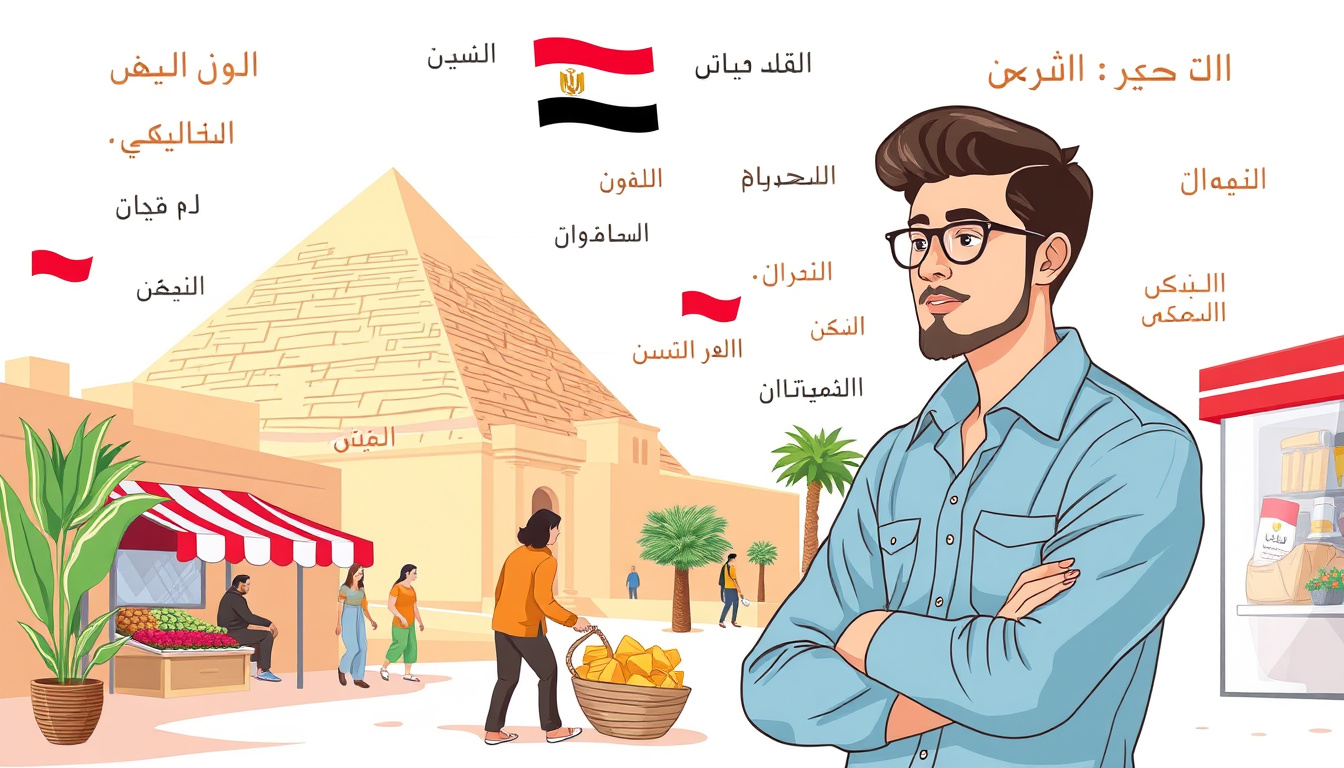Learning a new language is an exciting journey, and Egyptian Arabic offers a vibrant gateway to understanding Egypt’s rich culture and daily life. Whether you’re planning a visit, aiming to connect with Egyptian friends, or simply curious about the language, mastering a set of essential spoken phrases can instantly boost your confidence. This guide will introduce you to fundamental Egyptian Arabic phrases, enabling you to start communicating effectively within just 15 minutes. Let’s dive in!
Understanding Egyptian Arabic: The Basics
Egyptian Arabic is a widely spoken dialect across Egypt and parts of the Arab world. It differs from Modern Standard Arabic (MSA) and other Arabic dialects by its vocabulary, pronunciation, and expressions. Learning common conversational phrases in Egyptian Arabic allows learners to engage naturally with native speakers, blending into everyday conversations easily.
Why Learn Egyptian Arabic?
- Widespread Usage: Egypt uses Egyptian Arabic not only in daily communication but also in films, music, and media.
- Cultural Access: Understanding the dialect opens doors to exploring Egypt’s rich traditions, stories, and social interactions.
- Practicality: Basic conversational skills help travelers, expatriates, or anyone interested in interacting with Egyptians comfortably.
Essential Egyptian Arabic Phrases to Get You Started
Greetings and Introductions
Master these phrases to begin your conversations warmly and correctly.
Hello: "إزيك" (Izayyak for males) / "إزيكِ" (Izayyik for females)
This is the most common informal greeting meaning “How are you?”.Hello (formal): "مرحباً" (Marhaban)
Though more classical, it’s less commonly used in everyday Egyptian speech.My name is…: "أنا اسمي…" (Ana ismi…)
Pronounce it slowly when introducing yourself, e.g., "أنا اسمي حامد" (Ana ismi Hamed).Pleased to meet you: "تشرفت بمعرفتك" (Tsharraft bimaʿriftak for males) / "تشرفت بمعرفتكِ" (Tsharraft bimaʿriftik for females)
Literally means "I am honored to meet you".
Polite Expressions
Knowing how to express thanks and polite responses ensures respectful exchanges.
Thank you: "شكراً" (Shukran)
This is widely used and understood across Arabic-speaking countries.You’re welcome: "عفواً" (Afwan)
A typical response to "thank you", meaning "it’s nothing."Thanks a lot: "ألف شكر" (Alf shukr)
This expression means “a thousand thanks,” a more emphatic form of gratitude.
Time of Day Greetings
Adjust your greetings according to the time of day for a natural flow in conversation.
Good morning: "صباح الخير" (Sabah el kheer)
A friendly morning greeting meaning “morning of goodness.”Good evening: "مساء الخير" (Masa’ el kheer)
Use this phrase to greet someone during the evening hours.Goodbye: "مع السلامة" (Maʿa as-salama)
Literally translates as “with peace,” the standard way to say goodbye.
Survival Conversation Phrases
These handy expressions will help you navigate everyday situations in Egypt.
Asking and Responding
Do you speak Egyptian Arabic?
- To a male: "بتتكلم مصري؟" (Betetkallem Masri?)
- To a female: "بتتكلمي مصري؟" (Betetkallemi Masri?)
Yes: "أيوه" (Aywa)
No: "لأ" (La’)
Excuse Me and Asking for Directions
Excuse me / please: "لو سمحت" (Law samaht)
Use this to politely get attention or ask for something.Where is…? "فين…؟" (Fein…?)
For example, "فين المطعم؟" (Fein el mat’am?) means "Where is the restaurant?"
Understanding and Clarification
I don’t understand: "مش فاهم" (Mish fahem) for males / "مش فاهمة" (Mish fahma) for females.
Please speak slowly: "من فضلك، اتكلم ببطء" (Minfadlik, itkallim bibut’) for males / "من فضلك، اتكلمي ببطء" (Minfadlik, itkallimi bibut’) for females.
Tips for Effective Learning
Practice with Native Speakers
Engage with Egyptian friends or join language exchanges to practice these phrases. Natural conversation accelerates retention and pronunciation skills.
Use Multimedia Resources
Listening to Egyptian music, watching Egyptian films, or following educational channels can familiarize you with pronunciation and contextual usage.
Start Small, Build Gradually
Focus on a handful of phrases daily, then steadily expand your vocabulary and complexity over time.
FAQ about Learning Egyptian Arabic
Q1: Is Egyptian Arabic very different from Modern Standard Arabic?
A1: Yes, Egyptian Arabic has distinct vocabulary and pronunciation. MSA is more formal and used in writing and formal speech, while Egyptian Arabic is colloquial and spoken daily.
Q2: Can I use Egyptian Arabic phrases across other Arab countries?
A2: While some phrases overlap, Egyptian Arabic is specific to Egypt. However, due to Egypt’s media presence, many Arab speakers recognize Egyptian phrases.
Q3: How fast should I expect to learn Egyptian Arabic?
A3: Basic conversational skills can be picked up within weeks with regular study; mastering fluency usually takes longer based on practice frequency and immersion.
Q4: Are Egyptian Arabic phrases gender-specific?
A4: Yes, some verbs and adjectives change form based on gender. For example, when addressing females, verb endings often differ.
Q5: Where can I practice Egyptian Arabic after learning these phrases?
A5: Language exchange meetups, online platforms, Egyptian community centers, or travel to Egypt provide great practice opportunities.
Conclusion
Starting your Egyptian Arabic journey requires just a handful of essential phrases to make meaningful connections and navigate everyday interactions. Greetings, polite expressions, survival phrases, and simple questions form the foundation to communicate with confidence. Remember, consistent practice and exposure to the language in context are key to gradual improvement.
By mastering these basics in just 15 minutes, you set the stage for deeper learning, cultural immersion, and richer experiences whether you’re traveling, working, or socializing in Egypt. Embrace the learning process, speak boldly, and enjoy the vibrant world of Egyptian Arabic!
Happy learning and اهلا وسهلا بك في رحلة تعلم اللغة العربية المصرية! (Welcome to your Egyptian Arabic learning journey!)

